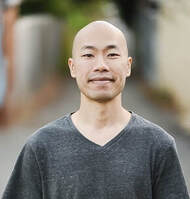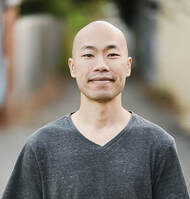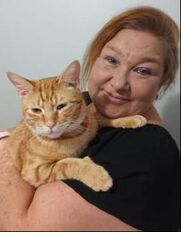 Written by Jaan C Peer Support Worker, The Wellness Initiative I remember being happy as a child. As long as my basic physical needs were met, I was a happy kid doing what most kids do. I was a pirate who drew maps that lead to hidden treasure. I was a detective who specializes in solving any and all cases. As a 90’s kid, I went from walking around like RoboCop to pretending to fly like Captain Planet. Nothing bothered me much and when it did, it didn’t last longer than an hour or so. I was more or less happy and content just living in the moment and enjoying the simple things. No responsibilities. No worries. Not a care in the world. Isn’t that why we often feel nostalgic for the good, old days? But somewhere along the way of growing up, I got it into my head that happiness was something to be pursued and acquired. It was no longer an unconditional birthright for me to experience. There were now apparent conditions that had to be met if I was to be happy again. I wanted to be liked by tons of friends so that I could fit in and be happy. I had to act a certain way in order to fit in. I had to figure out what I wanted to be when I grow up so that I can become “successful”, whatever that means. I had to have the latest “stuff” so that I could show people who I am and what I’m made of. I had to stand out. I had to be special. I had to be validated. I had to have control over my life and destiny. I’m not sure if I picked up such ideas from my peers, the adults around me, or the shows and movies that I watched. Possibly all of the above. And like a lint roller being used, I was picking up the lint of ideas that stuck to my mind and caused me to feel less happy, bit by bit over time. Less happy. Less content. More anxious. Mentally, it became a heavy burden to unknowingly harbor this mountain of destructive ideas and expectations. It’s too heavy a burden for any child to have to carry. Or any adult for that matter. Around my primary school years, I started having a tendency towards an extreme need for control out of fear and anxiety which I didn’t recognise at the time. This manifested as obsessive compulsive habits of checking things. And I mean I was checking everything. Everything needed to be checked, locked and secured. Items needed to be correctly lined up and arranged in a certain order. I had to write everything down because I was afraid that I’d forget something important, which would lead to a disaster. I had to wash my hands every time I touched any kind of surface. Fear of uncertainty. Need for control. From the outside it seemed quite comical at times, and I laughed along when friends and teachers poked fun at me in good nature for being so pedantic. I didn’t mind the jokes being at my expense because it was comforting to know that someone was entertained by something that was causing me so much anxiety. Being funny was a much nicer experience than being anxious. But in my teenage years the anxiety really ramped up. I couldn’t follow through with university studies because I was getting headaches from worrying about anything and everything. I dropped out and just hopped from job to job, not really knowing what I was supposed to do. Not knowing what was wrong with me. In between working I would distract myself from anxiety with entertainment and escapism in its many forms. It wasn’t until my thirties that I felt I’d had enough unnecessary suffering and started to question my life. I examined my life closely. I read. I studied. I took classes. I didn’t know where to look, so I looked everywhere. I dabbled in philosophy and psychology. I found faith and spirituality. I simplified my life and began meditating. I started on the path of gradually unlearning all the mental conditioning that kept me from experiencing happiness and contentment. I started to acknowledge, understand, accept and let go of the destructive thought patterns that kept me bound to anxiety and fear. It wasn’t a one-time epiphany, but the start of a lifetime endeavor. Day by day, I’m still making peace with anxiety each time it visits my mind. Sometimes depression also comes along. But it affects me much less now as I strengthen my mindfulness and gain more self-awareness over time. I’m more able to perceive these thought patterns and the emotions that they bring at a safe distance, so that they don’t rule my life as they once did. My daily behavior is no longer as erratic and emotionally charged as it once was. Everyone’s path is unique and we all have different ideas that often contradict each other. Each of our lives will play out differently. But in the big picture, aren’t we all just looking for happiness and contentment? Nowadays I feel that uncertainty is a given in life. Any sense of control is ultimately temporary and subject to change at any time without notice. I find it a much healthier and balanced approach to understand and accept this instead of fighting against it. So when I lost my happiness as a child, where did it go? Nowhere. My happiness never went anywhere. It’s here, right now where it’s always been. It’s here even as I’m about to finish writing this article. It was only the gradual and unconscious buildup of mental clutter that slowly blinded me to the peace and happiness that never left in the first place. Daily life often takes me away from the sense of happiness and contentment, but I try my best to find my way back to it time and time again. It’s a lifelong lesson that I will continue to learn and relearn. Otherwise, what’s the point? Author's Note: I hereby declare that I am the sole writer of this entire article, and that no artificial intelligence was employed in the conception of the material presented.
0 Comments
 Written by Jaan C Peer Support Worker, The Wellness Initiative Years ago I was very much in the unconscious habit of constantly blaming things around me for my lack of mental and emotional wellbeing. Someone was always annoying me. There was always too much traffic on the road. Other drivers were too rude. People that I disagreed with were always too this or too that for my liking. At home. In the workplace. In my social life. I carried this mindset with me everywhere I went. In short, my ideal world revolved around me. I had no tolerance of opinions and views that were different from my own. I was much too easily offended. If the world didn’t suit my expectations, then I was triggered to either anxiety, annoyance or anger. Sometimes it was a snowball effect of the three. And I would speak and act on those feelings too. I made sure that people around me knew I wasn’t happy. I felt strong (temporarily) for standing up for myself and lashing out. But now I understand that there’s a difference between calmly speaking my mind and verbally regurgitating my negative emotions. One comes from a place of composure and maturity while the other comes from a place of ignorance, fear and hurt. I found that my irrational outbursts would almost always trigger someone else to do the same. With a mindset like that it was no surprise that I often found myself in unpleasant interactions with those around me. I blamed people and I blamed circumstances for my lack of happiness. I blamed myself for failing to improve my situation. It’s a very heavy-handed and unforgiving approach to life that feels like emotional quicksand. I was totally oblivious to how this blame-oriented way of thinking and perceiving was directly affecting my mental health and emotional wellbeing. I couldn’t accept the world for what it is so I kept trying to mentally resist and control it. But these days, after a few years of self-inquiry and practice, I lean towards a more solution-oriented mindset. Whether it’s with people or situations, I don’t find it helpful to assign blame as a knee-jerk reaction anymore. Occasionally I find myself slipping back into a blame-oriented mentality, but it loses charge as soon as I notice it. Life gets difficult at the best of times so I certainly don’t want to be adding extra and unnecessary emotional baggage for myself by constantly blaming things. Whenever I encounter someone who is still in the blame-oriented mindset, I listen attentively as best as I can. I stay mindful and choose not to speak or act on the feelings of anxiety or irritation that can often come up when dealing with incompatible personalities. I may offer a gentle perspective of my own but if it’s met with negative emotional reactivity, then I usually just fall back to listening and accepting what’s being said. I may not agree with it, but I can still listen and validate someone’s differing opinion. I don’t feel much need to defend my own views anymore, especially if it’s going to cause a destructive interaction. To defend is to protect ourselves against a threat of any nature, whether actual or perceived. I used to be quite verbally defensive because deep down I felt threatened by anyone whose views contradicted my own. I always wanted to prove my point and make them understand. Even if I was getting nowhere, it felt good to argue for the sake of it because I blamed the other person for not seeing things the way I do. But these days I find that in not being so defensive, it sometimes allows the other person to let their guard down and open up to me. At the very least, it creates an opportunity to connect with someone instead of seeing them as an enemy. Collective change is less likely if we’re still caught in the blame game and always defending ourselves against each other. Some conflicts are unavoidable but I found that many can be with a more solution-oriented perception of the world. After all, how can someone argue with a person who doesn’t defend themselves? It would be like trying to punch the air. No harm can be done. Blame-orientation tends to create more division among people (and within ourselves), but solution-orientation encourages unity where possible. There’s a difference between having a discussion to reach a solution, and an emotionally charged argument that aims to tear each other down. There’s a difference between observing the cause of a problem, and making an emotionally charged judgment. There’s a difference between working towards a change and trying to force change to happen. Sometimes the solution is to speak up. Other times the wiser thing to do may be to keep quiet. Sometimes the solution is to change our perspective or environment (or both). Other times the wiser thing to do may be to accept things as they are. The intention behind our words and acts are what define the quality of our interactions with others and within ourselves. Author's Note: I hereby declare that I am the sole writer of this entire article, and that no artificial intelligence was employed in the conception of the material presented.  Written by Soraya T Peer Mentor, The Wellness Initiative I was diagnosed with Borderline Personality Disorder (BPD) in 2000 when I was 24. It was both a blessing and a curse. It was a name to describe my torrent of erratic emotions, feelings and behaviours but it also brought with it a barrage of stigma and discrimination. Descriptions such as “attention-seeker” and “manipulator” become the norm. Yes, we are attention-seekers, but who doesn’t? It is just that people with BPD often don’t know how to ask for the appropriate help in the appropriate way. Yes we can also be manipulators, but you have to understand that people with BPD often come from toxic relationships, often as far back as their early childhood. They never learnt respectful ways to maintain relationships while still getting what they want or need. It took me 7 years of really good therapy (and many years of not-good therapy) to understand myself most importantly, but also to understand my relationships with other people. To learn what was important to me, and the proper ways to go about achieving those goals. I also learnt the important people in my life, the not-important people all disappeared while I was behaving like an atomic bomb. I underwent 2 courses of Dialectical Behaviour Therapy (DBT). The second course was a light going off. I learnt how to name and respond to emotions such as anxiety and anger, acting in ways to use those emotions effectively instead of destroying everything around me. In 2016 my diagnosis of BPD was rescinded (not even traits) and I was congratulated by a psychiatrist for being the first person he had met who had recovered from BDP. Truly I don’t believe we ever “recover” from BPD. Some days I still wake up with a torment of thoughts that are jumbling my emotions. However using my DBT skills and other life skills I can sort through those thoughts and feelings and organise myself in a way that leads to a happy and healthy life. I’ve been happy to be working with the Wellness Initiative for 3 years, and during that time I have met a few participants who also experience BPD. It heartens me to be able to share some of my experiences and strategies for living healthily with BPD. I feel so warm when participants realise that their torment will not go on forever and that there is hope for them to have a full and happy life. I truly believe all my BPD experience has brought me here to a point where I can help others, and I believe that has given me the purpose that I have been looking for, for so long. |
The Wellness Initiative would like to acknowledge the traditional custodians of this land, the Nyoongar people. We acknowledge and respect their continuing culture and the contribution they make to the life of this region, city and boodja, and pay our respects to Elders past, present and emerging.
© 2025 The Wellness Initiative Pty Ltd. all rights reserved
ABN 21 633 581 450
Servicing Perth and surrounds
Email: [email protected]
Phone: 0478 511 825
Follow us on socials!
